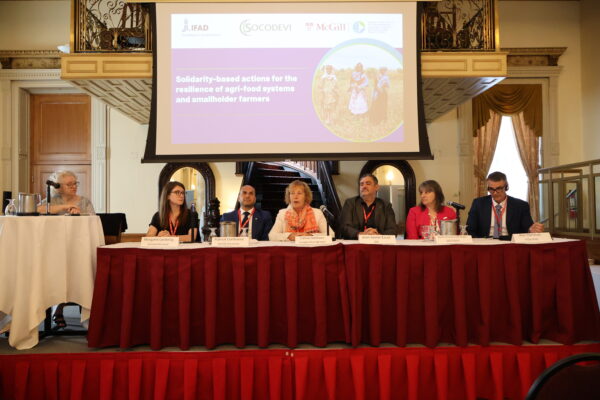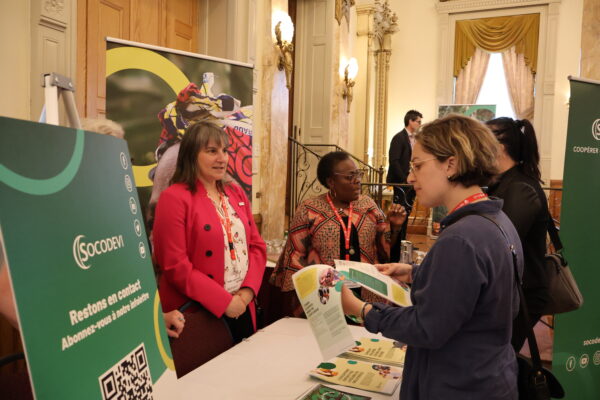The resilience generated by collective actions and the cooperative model was at the heart of discussions at the event “Solidarity-based actions for the resilience of agri-food systems and smallholder farmers”, held on May 31 at McGill University in the presence of the President of the United Nations’ International Fund for Agricultural Development (IFAD), Alvaro Lario.
In his opening address, Alvaro Lario asserted that the cooperative model “supports and catalyzes investments for transformation” toward resilient agri-food systems.
“Increased investments in rural areas are needed if SDG 2 [zero hunger] is to be achieved. Smallholder farmers and rural agricultural entrepreneurs around the world do not have sufficient access to the financing necessary to increase productivity, recover from shocks, and be effectively integrated into food value chains. Women stand to especially benefit from these programs, as a range of gender-based obstacles result in women-owned plots in Sub-Saharan Africa being 30% less productive than those owned by men. There is therefore tremendous potential to improve food system production and resiliency through female empowerment. “
-ALVARO LARIO, President, IFAD
Speaking of investment: on the panel, his colleague Ron Hartman, IFAD’s Director of Global Engagement, Partnerships and Resource Mobilization, mentioned that smallholder farmers are increasingly affected by climate change, conflict and economic volatility, while the amount of official development assistance (ODA) devoted to agriculture has stagnated at between 4% and 6% of ODA for at least two decades.

Yet small-scale farmers receive less than 2% of global funding to combat climate change. Every dollar spent today to strengthen rural resilience can save up to $10 in humanitarian and emergency aid in the future (CERES 2030).
IFAD points out that smallholder farmers produce a third of the world’s food, and up to 70% of the food produced in low- and middle-income countries. They are essential to food security and global stability, as hunger and poverty can also fuel forced migration and conflict.
At SOCODEVI, we are convinced that the cooperative and mutualist movement brings concrete solutions to this resilience and increases the impact of agricultural investments for climate change adaptation and inclusive agricultural development.
Concrete examples
Marie-Christine Bélanger, Director of Consulting services and Innovation at SOCODEVI, gave the example of the cooperatives supported by SOCODEVI with Canadian funding in Ukraine, where the coop model has become a tool of resistance, a means of uniting against war.
“Agricultural cooperatives continue to operate, in some cases close to the front lines or in areas recently liberated from occupation. Cooperatives have also become hubs for services, information and education, including humanitarian aid. In another example, in Sumy oblast, an agricultural cooperative responded to the needs of its members by setting up a driving school for women who were particularly vulnerable, being unable to evacuate without their husbands and drive the family vehicle.”
-MARIE-CHRISTINE BÉLANGER, Director of Consulting services and Innovation, SOCODEVI
IFAD President Alvaro Lario also explained from the outset that community development was at the heart of IFAD’s post COVID-19 recovery efforts.
“Indeed, in the aftermath of the pandemic, we found that regions that had adopted the community-based approach were able to rebound faster and more vigorously than those that had not adopted the same population-centered approach. In other words, we saw with our own eyes just how much we can accomplish when we’re united.”
This is also what SOCODEVI found in a study conducted with the International Development Research Centre on cooperative development for rural family resilience.

This study, presented at the SOCODEVI booth during the innovation fair that followed the panel, shows that members of well-consolidated agricultural cooperatives suffered less from food insecurity and economic disruption induced by the COVID-19 pandemic than members of cooperatives with little or no activity.
‘’For us, a dynamic cooperative is one that interacts with its members, provides information, maintains its marketing channels, distributes seeds for food crops and so on,” explained Marie-Christine Bélanger. ‘’We found that members of dynamic cooperatives were better off in terms of their food security, but also in terms of their well-being. It’s as if the co-op had acted as a social safety net.’’
Time for women and young people
The place of young people and women not only in agriculture, but in food systems as a whole was also discussed during the panel.
Including women and young people in income-generating activities in food systems is essential for the resilience of these same systems and people, as women reinvest the money they earn to improve their family’s food security.
With the presence of Morgane Leclercq, research professional at Université Laval’s Chaire de recherche en droit sur la diversité et la sécurité alimentaires, the panel’s discussions reflected on the importance of valuing the role and leadership of women who, throughout the world, are very often pioneers in the conservation of local indigenous seed banks.
Seed banks are essential to biodiversity, and offer a rich history of adaptation to local biophysical and climatic conditions, as well as a rich cultural history of belonging to the land.
Collective initiatives are also excellent ways for communities to access inputs and choose climate-resilient seeds that also correspond to their food preferences, “an important element of their food security”, as Patrick Cortbaoui, Managing Director of McGill University’s M. A. Gilliam Institute for Global Food Security, reminded the panel.
According to IFAD, redesigning food systems could generate $4.5 trillion in new business opportunities every year, create more than 120 million decent rural jobs, help limit global warming and regenerate natural ecosystems, and reduce the $12 trillion in costs and waste currently generated by the food system every year.
The event was organized by SOCODEVI with McGill University’s Margaret A Gillam Institute for Global Food Security, in collaboration with IFAD. Panelists were Ron Hartman, Director of Global Engagement, Partnerships and Resource Mobilization, IFAD ; Marie-Christine Bélanger, Director of Consulting services and Innovation, SOCODEVI ; Céline Delhaes, Dairy and Berry Producer, Agropur cooperative ; Morgane Leclercq, Research Professional, Chaire de recherche en droit sur la diversité et la sécurité alimentaires (DDSA) de l’Université Laval ; Jean-Xavier Escot, Practice Leader – Entrepreneur Support Service, Développement international Desjardins and Patrick Cortbaoui, Managing Director, Margaret A. Gilliam Institute for Global Food Security, McGill University. The panel was moderated by Michèle Asselin, Executive Director of AQOCI.